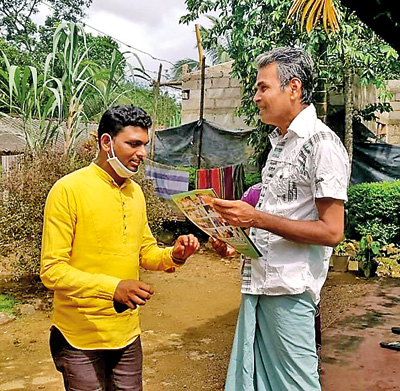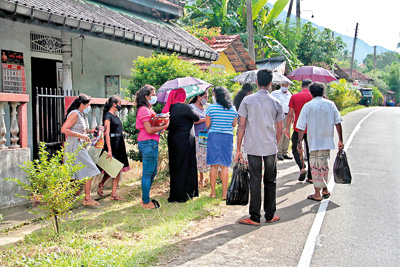News
Hundreds of millions for polls campaigns, but who is funding whom?
To carry out a strong campaign for the August 5 general elections, a candidate needs at least Rs 10 million, but he or she is often unable to raise that amount. In contrast a well-known candidate spends millions of rupees since he or she can pull in funds from various sources, an advertising agency publicist said.

Chandra Kumar on a house-to-house campaign in a tea estate in his electorate Nivitigala, Ratnapura last week. Courtesy-FB/Chandra Kumar
As the elections draw near, advertising agents say that in the electronic and print media their charges have been increased. On television, a ten-second clip will cost at least Rs 170,000, depending on the broadcast slot.
If the advertisements are to be telecast during peak hours, charges go up to a million rupees. There are additional packages that will allow a candidate’s campaign trail to be included in main election campaign coverage. In the print media, charges range from Rs 600,000 – Rs 900,000 for a full page advertisement.
Without posters and election banners, well-funded candidates turned towards social media, particularly Facebook, for specific, targeted campaigns based on geographic locations of the users.
As of now, polls candidates had spent $234,692 on 15,860 elections related advertisements on Facebook since the nominations, according to the Facebook Ad-library which published expenditure details of advertisements appearing on the timeline of a user.
Leading political parties and their insiders refused to divulge information on funds received for or spent on election campaigning. Campaign finance is not regulated.
The Janatha Vimukthi Peramuna (JVP) was pooling money from its supporters by selling donation tokens. Expenditure would be made public soon after the polls were concluded, the party’s Propaganda Secretary Vijitha Herath said.
“Our party decided to campaign in groups across every electoral district, avoiding individual campaigns since it would be an effective way to introduce new faces and reduce additional costs,” he aid.
Mr Herath assured the party would be transparent in its elections-related finances, unlike other parties.
An independent election watchdog estimated that from July 2 to July 16, Rs 513 million had been spent on electronic, print and social media in addition to expenses for election rallies by the seven leading political parties.
The Centre for Monitoring Election Violence (CMEV) had devised a four-tier methodology to estimate the expenditure of leading political parties on various platforms, a spokesperson said.
The European Union’s Election Observation Mission (EoM) which monitored Sri Lanka’s last Parliamentary election also said that since party and campaign finance was not regulated, there was a lack of transparency, accountability and the absence of a level playing field among candidates. This was contrary to international standards.
“According to EU interlocutors, election campaigning is costly and some candidates allegedly spent more than EUR 500,000 each,” the EoM’s final report said.

SLPP party supporters canvassing in Pelmadulla. Pic by Indika Handuwala
“Transparency International Sri Lanka (TISL) reported that some candidates spent more than Rs 300 million (2 million EUR), and from the the main coalition the average expenditure of a candidate was around EUR 100,000.”
The report said that as candidates covered their own costs with little or no support from the party, only those with access to financial resources could afford to mount a high-profile campaign.
Under election laws, the State is bound to assist registered political parties which had polled at least one percent of the valid votes in an electoral district in the previous election. The State makes a symbolic contribution of Rs 50 a vote to cover campaign costs.
While hundreds of millions of rupees are being spent for the August 5 polls and little is known about who is funding whom, one of the candidates facing finance problems is Mookan Chandra Kumar.
He has taken a break from teaching political science to contest the general elections, hoping longstanding social activism in his electorate at Nivithigala in Ratnapura, could be a stepping stone to Parliament.
Mr Chandra Kumar won some 30,000 votes at the last Parliamentary polls but not a seat. He is hopeful this time of winning one, provided he can reach voters in remote areas through aggressive campaigning.
If elected on the Samagi Jana Balawegaya (SJB) ticket, Mr Chandra Kumar would be only the second Tamil-speaking elected representative from Ratnapura since 1989. The district has 117,000 Tamil-speaking registered voters, a majority from the plantation areas.
Like Chandra Kumar, hundreds of candidates, particularly new ones, are struggling to market their image and policies.
United National Party (UNP) contestant Lawyer Maneesha Seneviratne, had similar financial difficulties and insufficient party support in her Kandy district electorate. With less than two weeks left for the polls, she is using the free stamp facility given to candidates to reach voters through snail mail.
“Even those free posts are not being prioritised by the Postal Department,” she complained.
Postmaster General Ranjith Ariyaratne told the Sunday Times the free stamp quota for candidates was determined by population and registered voter size of their electorates. While all candidates, including independent ones, are entitled to it, some did not use it, he said.
Candidates are barred from showcasing their preferential number and party symbol in public places except while conducting an election meeting. Leading candidates in an electoral district are entitled to open a party office in their electorates where they can exhibit the party symbol and preferential numbers.
Political parties and candidates are aggrieved by the majority decision of the three-member Election Commission to strictly implement the Parliamentary Elections Act of 1981 this time, rather than continuing to follow circulars issued by the Election Secretariat since 2005. These circulars amend provisions in the Act for practical issues, such as allocating playgrounds for rallies or putting up posters in public places.
Party representatives took up these issues with the Commission last month, but they said it was of no use. They complain they were unable to campaign as aggressively as those who were well-funded and well-connected.
But the Commission maintains it is only following the law. An official said if any clauses were to be amended, Parliament’s approval was necessary.
While acknowledging the difficulties faced by the candidates when it comes to election campaigning, Election Commission spokesperson Channa De Silva said the Commission’s regulations were adhered to.

